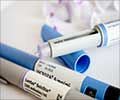Clinical trials with a non-invasive and painless system, which can assess people's average blood-sugar levels, is all set to begin in Christchurch, New Zealand.
Clinical trials with a non-invasive and painless system, which can assess people's average blood-sugar levels, is all set to begin in Christchurch, New Zealand.
Scientists at Canterbury University have joined forces with medical researchers at Christchurch Hospital for the purpose.The researchers believe that the breakthrough system may revolutionise the way diabetics' long-term glucose levels are monitored, and provide an easier way to identify people with the disease.
They say that the machine can provide diabetics with an accurate snapshot of their blood-sugar levels, based on which they can adjust their food, exercise, and medication without the need for painful blood tests.
Dr Brett Shand, a member of the Lipid and Diabetes Research Group at Christchurch Hospital, said that trials could take around two.
The researcher revealed that the machine would detect glucose levels accurately by the fluorscence of skin under ultra-violet light.
According to Shand, all the test would involve was having a fluorescent light shone on patients' skin.
Advertisement
The researcher further said that the new test would be cheaper than laboratory blood tests, and could be used for screening.
Advertisement
The system would initially be tested on patients with type-2 diabetes, according to the researcher, but it could also be used on young children with type-1 diabetes.
It the trials provide promising results, such a test could reduce the risk of diabetes-related complications like eye damage and kidney disease, say the researchers.
"New Zealand has the second highest rate of diabetes in the world. This disease is a big drain on our health resources and if we can help people manage it and educate them about blood sugar levels it could make a huge difference," said New Zealand's leading diabetes expert Emeritus Professor Don Beaven, of the Christchurch School of Medicine.
Source-ANI
SRM/SK















